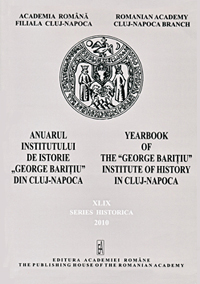Un proiect interbelic eşuat: Mélanges Russo (1929-1930)
A failed interwar project: Mélanges Russo (1929-1930)
Author(s): Leonidas RadosSubject(s): History
Published by: Editura Academiei Române
Keywords: Reverential volume; Byzanthinic Studies; interwar historiography; The New School in history
Summary/Abstract: The interwar years have knew less historiographical failed projects than the previous periods specially comparing to the second half of the XIX century. A such approach with an unexpected end was the volume prepared in the praise of the professor Demosthene Russo, who fulfiled 60 years in 1929, by two closed collaborators of him. Public figure of the interwar intellectual history, respected professor at University of Bucharest, Russo was perceived by his numerous students as a genuine school master and supreme critical instance in the complicated domain of the Byzanthine studies and the greek-romanian interference. Vital information for our research are founded in a set of inedit letters (see Anexes) which include the correspondence held by the initiators of the project, C.C. Giurescu, professor at Faculty of Literature from University of Bucharest, and I. D. Stefanescu, first assistant and later lecturer at the Byzanthinic department with diverse collaborators. Started late and clumsily because of the self imposed status to keep the secret to the solemnized, the Melanges Russo project has been contoured, having enough interesting texts in portofolio and others waited to be put on the list. Surprinsingly, the project was suddenly stopped by the celebrated himself, probably a singular case in the history of Romanian culture. In April 1930 professor Russo fortuitously heard about the initiative of his colleagus from Georges Sotiriou, the principal of the Byzanthine Museum from Athens who declined the requirement of Giurescu and Stefanescu to send a text and choose to write to the professor Russo in order to underline that only the restrictive thematic of the volume detained him to offer a serious study. It is difficult to speculate on the motives for which Demsthene Russo has reacted so strong and stopped the editing of the volume, particularly that similar initiatives has been passed to the end of the XIX century and even some less remarcable figures have part of it. It seems that «culpabled» were the character abd the nature of the professor himself, who, mainly in the latter time, refused the obvious publicity and preferred instead the friendly weekly meeting with students and associates.
Journal: Anuarul Institutului de Istorie »George Bariţiu« - Series HISTORICA
- Issue Year: XLIX/2010
- Issue No: 49
- Page Range: 259-285
- Page Count: 27
- Language: Romanian

